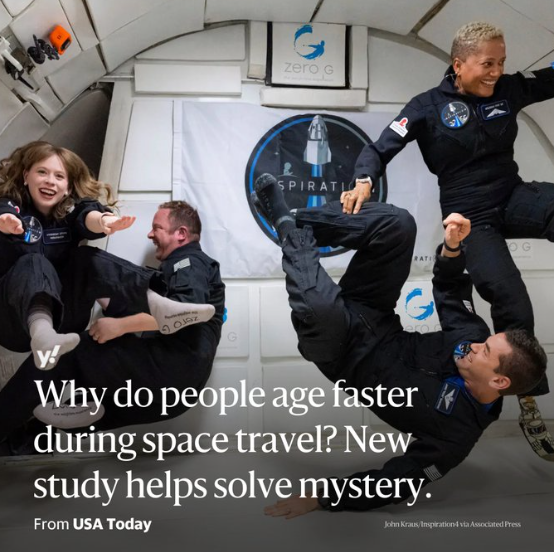Elon Musk has a lot in front of him if we are to actually colonize the Moon and Mars.
The prospect of colonizing another planet hinges not just on technological advancements but also on our understanding of how space travel affects human health. A series of new research papers shed light on this issue by studying the biological impacts of spaceflight on the human body, from skin cells to genes, during and after the SpaceX Inspiration4 mission in 2021. This mission was notable for its all-civilian crew who spent three days in low-Earth orbit.
Before we dream of traveling to another planet, scientists need to understand why humans age faster during space travel. That’s why four astronauts agreed to be observed in 2021 as they circled in low-Earth orbit for three days. Here’s what they found. https://t.co/pwOr809r9F pic.twitter.com/Nm67kNAp78
— Yahoo News (@YahooNews) June 12, 2024
During their space journey, the crew experienced significant physiological stress and signs of accelerated aging. However, research revealed that 95% of the health indicators returned to normal within months after their return, highlighting the body’s resilience. Susan Bailey, a radiation cancer biologist and one of the study’s authors, emphasized the rapid cellular aging caused by radiation exposure, even over short periods.
This body of research, published in Nature and its subsidiary journals, extends beyond the experiences of traditional astronauts, like the often-studied NASA astronauts, to include civilians with diverse backgrounds. This approach aims to broaden the understanding of space travel’s effects across different demographics. For example, crew member Hayley Arceneaux, a cancer survivor and the mission’s medical officer, represents younger and female demographics rarely seen in space.
The studies addressed various health challenges that astronauts might face, including the development of conditions like kidney stones, which could pose significant problems on longer missions, such as to Mars. The research team, which includes experts like Christopher Mason and Afshin Beheshti, also discussed gender differences in recovery from space travel, noting that while women might recover faster, they could face higher long-term risks of certain cancers due to radiation.
🚨 COULD SPACE TRAVEL COMPROMISE YOUR HEALTH?
While we’re all excited to go to Mars, space tourists could face potential health risks like astronauts.
Even normal air travel affects the human body, causing pressurization of the body, jet lag, dehydration, and increased exposure… pic.twitter.com/TetHLmvvPH
— Mario Nawfal (@MarioNawfal) June 12, 2024
Beyond understanding the negative effects, the research also focuses on potential benefits for Earth-bound medical practices. For instance, insights gained from protecting astronauts from radiation could improve treatments for cancer patients or those exposed to radiation during work or disasters.
Moreover, the mission utilized novel technologies to monitor health, including handheld ultrasound devices, smartwatches, and new methods for immune system profiling. These tools could also enhance medical care in remote or under-resourced areas on Earth.
The non-professional status of the Inspiration4 crew facilitated a more relaxed study environment, as they were not bound by the same regulations that govern professional astronauts. The data collected from these civilians will be accessible to the broader research community, potentially speeding up advancements in space medicine.
Both Arceneaux and fellow crew member Chris Sembroski expressed their willingness to participate in future missions, underscoring the importance of sharing their experiences to advance space exploration and prepare humanity for life beyond Earth.
🚀🇺🇸 JUST IN: Space’s Impact on Body & Mind
Three days in space alters cognition, stresses immune systems, and triggers genetic changes in astronauts. Findings from the Inspiration4 mission show potential health impacts of space travel.
[Source: The New York Times] pic.twitter.com/vIpwYIjwZ7
— RSxAI News (@RSxAI_News) June 13, 2024
Overall, the findings from the Inspiration4 mission contribute to the growing body of knowledge that will help us prepare for the physiological challenges of long-duration space travel. The research suggests that while there are significant obstacles, there are no insurmountable barriers to extending human presence to Mars and potentially beyond.
Major Points:
- The SpaceX Inspiration4 mission, featuring an all-civilian crew, provided new insights into how space travel affects human health, revealing significant physiological stress and signs of aging that largely reversed after return.
- Research highlighted the resilience of the human body, with 95% of health indicators returning to normal within months, emphasizing the potential for long-duration space travel.
- The studies explored a range of health issues, including the risk of developing conditions like kidney an issue during longer space missions and the unique recovery patterns between genders, with women potentially facing higher cancer risks from radiation exposure.
- Innovative medical technologies used during the mission, such as handheld ultrasound and smartwatches, could benefit medical practices on Earth, particularly in remote areas.
- The data gathered from civilian astronauts, which will be shared with the broader research community, underscores the feasibility of extended human presence in space, advancing the goal of colonizing other planets.
Fallon Jacobson – Reprinted with permission of Whatfinger News



